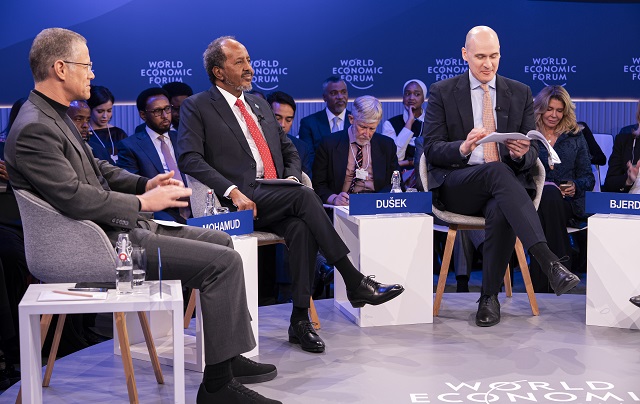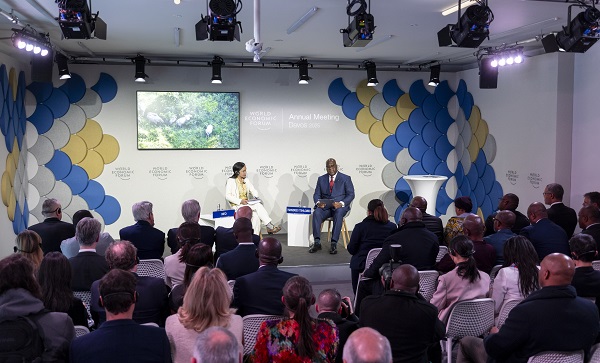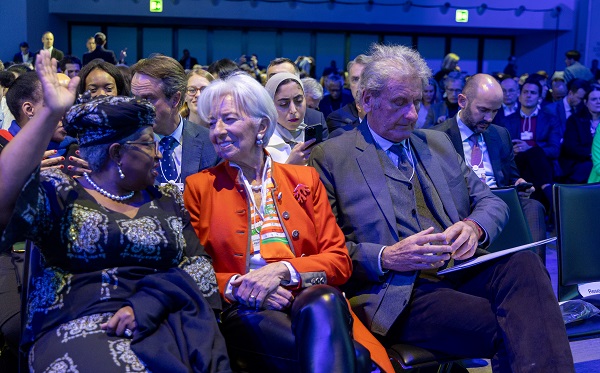
Anti-poverty report sees billionaire wealth surging as poverty is unchanged since 1990
COVER STORY | RONALD MUSOKE | On Jan.20, the global anti-poverty NGO, Oxfam International published its 2025 report. It coincided with the day business elites gathered in the Swiss resort town of Davos for the World Economic Forum Annual Meeting and American billionaire, Donald Trump, backed by the world’s richest man, Elon Musk, was inaugurated as President of the United States.
According to the Oxfam report, the billionaires’ wealth grew three times faster in 2024 than in 2023 and an average of four billionaires, majority of whom are from Western Europe and North America, were made per week.
According to the report, each billionaire saw their fortunes grow by US$ 2million a day on average. However, for the richest 10 billionaires, their fortunes grew by US$100 million a day on average.
And that included African billionaires too. In South Africa, the combined wealth of six billionaires increased by US $4.1 billion in 2024, or US$11 million per day. Together they now own US $29.4 billion. In Nigeria, the wealth of four billionaires (US $23.7 billion) could easily cover the whole of Lagos city in 500 Naira notes.
For context, Oxfam notes that even if an average citizen in the so-called Global South were to save US$1000 daily since the first humans walked on earth 315,000 years ago, they still would not have as much money as one of the richest 10 billionaires and, even if any of the richest 10 billionaires lost 99% of their wealth, they would still be a billionaire.
According to the report, there has never been a better time to be a billionaire than now. Their wealth has skyrocketed to unprecedented levels.
Last year alone, the world’s renowned billionaires raked in close to US$5.7 billion per day and their collective wealth surged to about US$ 2 trillion according to the report.
The election of Donald Trump as U.S. President in November 2024 gave a huge further boost to billionaire fortunes, while his policies are set to fan the flames of inequality further.
The Oxfam report is entitled: “Takers Not Makers”. It notes that the enormous surge in the billionaires’ takings was preceded by a year of massive resource extraction by the Global North from the Global South. Oxfam notes in its report that the richest 1% in the Global North took US$30 million an hour from the Global South through the financial system in 2023.
Meanwhile, the number of people living in poverty has barely reduced since 1990, according to World Bank data, and levels of inequality between and within countries remain a growing concern.
The findings of this year’s Oxfam report were not lost on Winnie Byanyima, the Ugandan former head of Oxfam who is now the UN Under Secretary-General and Executive Director of UNAIDS. “Dozens of billionaires are sipping champagne and zipping down the ski slopes at this year’s World Economic Forum in Davos, Switizerland, as millions in Zambia endure the harsh realities of extreme poverty, with two thirds of the country living on less than US$2.15 a day–a fraction of the cost of a Cappuccino in Davos,” she noted in a Jan.23 opinion published by Doha-based Al Jazeera. Byanyima said the contrasting scenes underscore a grim reality of the world’s wealth being “grotesquesly concentrated in the hands of a few.”
Last year, Oxfam predicted the emergence of the first trillionaire within a decade. However, with billionaire wealth accelerating at a faster pace, this projection has expanded dramatically. Oxfam says, at current rates, the world is now poised to see at least five trillionaires within that timeframe.
“The remarkable rise in billionaire wealth, combined with only a minimal reduction in global poverty levels, presents a troubling view of a world that prioritises wealth accumulation over fair development,” Francis Shanty Odokorach, the Country Director of Oxfam in Uganda, told The Independent on Jan.23 in an email.
This report emphasises the increasing inequality that worsens poverty and systemic underdevelopment in the Global South, he said. Odokorach said the findings of the report show how colonial exploitation has continued through inequitable global financial systems, unchecked accumulation of inherited wealth and monopolistic practices.

“The fact that the wealthiest individuals in the Global North extract US$30 million an hour from the Global South highlights how the current economic system continues to siphon resources from the world’s poorest regions, leaving their governments struggling to meet their people’s needs.”
“There are insufficient resources to invest in essential services such as healthcare and education resulting in poor service delivery in most Global South countries.”
Billionaire wealth is not earned wealth
The idea that extreme wealth is a reward for extreme talent is pervasive and strongly reinforced in our media and popular culture.
In fact, the report shines a light on how, contrary to this popular perception, billionaire wealth is largely unearned —60% of billionaire wealth now comes from inheritance, monopoly power or crony connections.
It says that taken together, today’s levels of extreme wealth concentration are not based on merit. It points at the wealth transfers not just to the ultra-rich, but disproportionately to the ultra-rich in the Global North.
“These are takers, and not makers,” says the report.
This report shines a light on two major categories of unearned wealth: First, a new oligarchy in which inheritance, cronyism and monopoly power generate extreme wealth.
The report says much of the wealth of the ultra-rich is not about what you know, but who you know: who you lobby, who you entertain, whose campaign you finance or which person you bribe. In short, much extreme wealth is the product of crony connections between the richest and governments. There is a clear link between the areas of the economy that are prone to such cronyism and concentrations of wealth.
There are basically more billionaires and ultra-rich people in the more crooked, corrupt and captured parts of the global economy, and this is not a coincidence. Oxfam calculates that 6% of the world’s billionaire wealth is from crony sources.
Secondly, the reckoning with colonialism not just as a history of brutal wealth extraction, but also as a powerful force driving extreme levels of inequality today.
“Ours is the age of billionaire colonialism,” the report says.
“Unmerited wealth and colonialism —understood as not only a history of brutal wealth extraction but also a powerful force behind today’s extreme levels of inequality— stand as two major drivers of billionaire wealth accumulation,” the report reads in part.
Oxfam notes in its report that many of the super-rich, particularly in Europe, owe part of their wealth to historical colonialism and the exploitation of poorer countries. For example, the fortune of French billionaire, Vincent Bolloré, who has put his sprawling media ‘empire’ at the service of France’s nationalist right, was built partly from colonial activities in Africa.
“The chasm of wealth inequality between rich countries and the majority of countries in the world is not an accident — it’s the legacy of colonialism. Former colonial powers didn’t just exploit resources on an unimaginable scale; they also designed and built a global financial architecture to perpetuate that theft,” said Fati N’zi-Hassane, Oxfam International’s Africa Director.
For instance, Oxfam notes that of the US$64.82 trillion extracted from India by imperial British government, over a century of colonialism, US$33.8 trillion went to the richest 10%; this would be enough to carpet London in £50 notes almost four times over.
And in what Oxfam’s report describes as modern-day colonialism, the so-called Global North countries control 69% of global wealth, 77% of billionaire wealth and are home to 68% of billionaires, despite making up just 21% of the global population. The average Belgian has about 180 times more voting power in the largest arm of the World Bank than the average Ethiopian.
In 2023 – for the first time – more new billionaires got rich through inheritance than through entrepreneurship. All of the world’s billionaires younger than 30 inherited their wealth. The next three decades will see over 1,000 of today’s billionaires transfer more than US$5.2 trillion to their heirs. Oxfam calculates that 36% of billionaire wealth is derived from inheritance. Worse still, this transfer will be largely untaxed.

“Unchecked, we are about to see the biggest transfer of the largest generational wealth in human history handed over – hardly earned, hardly taxed,” the report says.
Oxfam’s analysis shows that two-thirds of countries don’t tax inheritance to direct descendants at all. Half the world’s billionaires live in countries with no inheritance tax on the money they will give to their children when they die.32 Latin America is the region with the highest volume of inherited wealth in the world, yet just nine countries in the region tax inheritance, gifts and estates. This is rapidly creating a new aristocracy where extreme wealth is transmitted across generations.
Unfair systems
Low- and middle-income countries spend on average nearly half of their national budgets on debt repayments, often to rich creditors in New York and London. This far outstrips their combined investment in education and healthcare. Between 1970 and 2023, Global South governments paid US$3.3 trillion in interest to Northern creditors.
Countries are facing bankruptcy and being crippled by debt; they do not have the money to fund the fight against inequality. On average, low- and middle-income countries spend 48% of their budgets on debt repayments, often to rich private creditors based in New York and London. This is far more than their spending on education and health combined.
Globally, women are more often found in the most vulnerable forms of informal employment, including domestic work, than their male counterparts.
Racialised women living in poverty, especially those in the Global South, continue to subsidise the global economy. Each day, women contribute an estimated 12.5 billion hours of unpaid care work, adding at least US$10.8 trillion in value to the global economy; the economic contribution of their care work is three times the financial value of the global tech industry. This extremely high level of inequality is driving suffering worldwide, and undermining any progress in bringing an end to poverty
Migrant workers in rich countries earn, on average, about 13 percent less than nationals, with the wage gap rising to 21% for women migrants.
“For humanity to have hope of ever ending poverty, world leaders and governments must first commit to dismantling the vestiges of colonial-era systems that shackle billions of people, starting with the deeply unfair international financial system,” said N’zi-Hassane.
“The international financial system must transform to adequately address the problems of public debt and illicit financial flows so that governments in the majority of countries around the world too can collect and use their taxes to provide lifesaving and inequality-busting public services such as healthcare and education.”
Byanyima says there is nowhere else the imbalance of wealth and power are particularly glaring than international spaces. She mentions the recent UN climate conference in Baku, Azerbaijan, where more than 1,700 lobbyists for the fossil fuel industry outnumbered almost every national delegation attending.
“Wealthy nations prioritised their agendas. Unsurprisingly, the final commitments towards the climate made at COP29 fell US$1 trillion short of what will be needed every year,” says Byanyima, adding that the international spaces of the World Bank and the International Monetary Fund (IMF) are equally emblematic of the power of imbalances that are driving inequality to new heights.
Rich countries dominate both of these institutions, setting the rules of the international, financial system in ways that serve their own banks and balance sheets. Byanyima says 94 out of 100 countries with current World Bank and IMF loans have cut investments in public education, health and social protection over the past two years.
Around the World, 3.3 billion people now live in countries that spend more on debt repayments than on education or health. The IMF and World Bank now acknowledge the inequality is a grave threat to economic stability, social cohesion and democracy.
Yet their actions fuel further imbalance, despite statements about tackling economic and gender inequality. Not much has changed. The powerful make decisions; the marginalised pay the price. Money is flowing out of poor economies, in debt servicing, when it should be flowing in. Meanwhile, corporate wealth continues to swell.
Seven of the 10 largest companies on earth are controlled by billionaires, their combined value surpassing the economies of Africa, Latin America and the Caribbean. At the same time, the wages of nearly 800 million workers failed to keep up with inflation, resulting in an average annual loss equivalent to 25 days of income.
While the working class struggles to get by, people living in poverty all over the world continue to face multiple crises. The scars of the pandemic are still with us in the form of unpayable debts, lower wages and far higher food prices, making day-to-day life a struggle for billions of people.
Conflict is also increasing, which drives further poverty, hunger and inequality. The huge human impact of climate breakdown grows each year with deaths from excessive heat, extreme weather and hunger.
No end to poverty
In its most recent report on poverty, the World Bank calculates that if current growth rates continue and inequality does not decrease, it will take more than a century to end poverty. Conversely, the report shows that if we reduce inequality, poverty could be ended three times faster. While overall poverty rates have fallen across the world, the number of people living under the World Bank poverty line of US$6.85 (PPP) today is the same as it was in 1990: almost 3.6 billion people.
Today this represents 44% of humanity. Meanwhile, in perverse symmetry, the richest 1% own almost an identical proportion – 45% of all wealth. One in ten women in the world lives in extreme poverty (below US$2.15 a day PPP); 24.3 million more women than men live in extreme poverty.

Going forward, Oxfam wants governments to act rapidly to reduce inequality and end extreme wealth. “Governments need to commit to ensuring that, both globally and at a national level, the incomes of the top 10% are no higher than the bottom 40%,” says Oxfam International.
According to World Bank data, reducing inequality could end poverty three times faster. Governments must also tackle and end the racism, sexism and division that underpin ongoing economic exploitation.
The anti-poverty crusader is also rallying for the cancellation of debt owed by the poorest countries to the West. It also says there should be mechanisms to end the dominance of rich countries and corporations over financial markets and trade rules.
“This means breaking up monopolies, democratising patent rules, and regulating corporations to ensure they pay living wages and cap CEO pay,” notes Oxfam. “Restructure voting powers in the World Bank, IMF and UN Security Council to guarantee fair representation of Global South countries. Former colonial powers must also confront the lasting harm caused by their colonial rule, offer formal apologies, and provide reparations to affected communities.”
Oxfam also wants global tax policy to fall under a new UN tax convention, ensuring the richest people and corporations pay their fair share. Tax havens must be abolished. Oxfam’s analysis shows that half of the world’s billionaires live in countries with no inheritance tax for direct descendants. Inheritance needs to be taxed to dismantle the new aristocracy.
Odokorach told The Independent that all what Oxfam is doing is advocating for systemic reforms, urging action to dismantle structural inequalities to ensure equitable wealth distribution and promote governance systems that are accountable to the most vulnerable populations in the Global South.
“The most important step in any solution is to increase the taxes the super-rich must pay. “Not all countries have billionaires but every country has a rich elite; the richest 1% should be taxed the most everywhere, and taxes on the poorest should be reduced,” adds Byanyima.
 The Independent Uganda: You get the Truth we Pay the Price
The Independent Uganda: You get the Truth we Pay the Price



